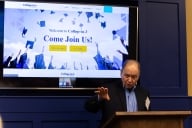You have /5 articles left.
Sign up for a free account or log in.
The Obama administration is toughening its regulation of for-profit colleges in numerous straightforward ways, most notably and publicly by taking another shot (after a federal judge blocked the last one) at drafting rules requiring vocational programs to prove that they are preparing students for "gainful employment."
But advocates for the colleges and other, more independent observers accuse administration officials of discriminating against for-profit institutions in a less-visible way, too -- and twisting federal statutes to do so.
Specifically, they say, the U.S. Education Department is differentially applying rules governing state authorization of higher education programs, requiring for-profit institutions in California that are regionally accredited by the Western Association of Colleges and School to go through a rigorous state approval process from which the department has agreed to exempt nonprofit colleges that are accredited by WASC.
Education Department officials have told officials of the Western accreditor -- as they told Inside Higher Ed -- that federal rules adopted by the administration in 2010 purposefully distinguish between the two categories of colleges, justifying the department's decision to treat the sectors differently.
But many observers in California -- including Ralph A. Wolff, the former head of the Western accreditor's senior college commission -- say there is no legal justification for treating the institutions differently.
The department's failure to provide clear, public guidance to support its position, they add, leaves California institutions that enroll many thousands of students (and possibly institutions in other states that use such exemptions) vulnerable to finding out much later that they are not in good federal standing -- in a way that could force them to repay many millions of dollars in federal financial aid if they subsequently lost eligibility for federal aid.
"We cannot find any justification in the regulation for this interpretation...," Wolff wrote in an e-mail last month to WASC members. "It is our position that the WASC exemption [from state regulation] applies equally to all institutions we accredit."
Lawyers who have examined the language warn that the department could be setting itself up for another legal challenge.
Accreditation and State Authorization
This situation isn't easy to explain or understand -- bear with us.
It relates to the 2010 drafting of new regulations aimed at protecting the integrity of the federal financial aid programs, which the Obama administration undertook primarily out of concern about the increasingly large sums of federal student aid funds flowing to for-profit colleges and the quality of education those institutions were providing. While some of the rules -- like those governing gainful employment -- were aimed narrowly at community college and for-profit vocational programs, others, like regulations dealing with the credit hour and state authorization, applied across the board.
The state authorization regulation, which requires institutions to receive authorization from states in which in they enroll students to qualify for federal financial aid, was partially struck down by a federal court, but the administration's prodding prompted many states to intensify their oversight of colleges nonetheless. California, which had let its state-level oversight lapse badly in the latter half of the 2000s, was among those that stepped up its enforcement (though to what level is still debated).
In creating the new Bureau for Private Postsecondary Education in 2009, state lawmakers established a new two-level process for approving institutions to operate within the state's borders. To the dismay of consumer advocates, legislators exempted from the new bureau's tougher review any institution that had won the approval of a regional accreditor, as well as those accredited by a national agency such as the American Bar Association.
This is where the paths cross with the federal government's state authorization rule. Last spring, as the Education Department prepared to publish guidance as part of the regulation was set to take effect in early July, Wolff and representatives of California colleges engaged in numerous discussions with department officials about the exemption for WASC-accredited institutions.
They had been troubled by statements made by department officials last spring suggesting that the department would not recognize the California agency's exemption for accredited institutions as sufficient under the federal regulation's test, unless the state had specifically established them as educational institutions "by name" through a state charter or in the state constitution -- a status that applied to few institutions, and sent many California college officials digging furiously for their founding documents to try to explore.
"We have over 120 California private institutions with over 300,000 students that are affected by this exemption," Wolff recalls telling department officials. "You can't just blanket say that none of these institutions is eligible."
In meetings with Under Secretary of Education Martha J. Kanter (a longtime community college president in California) and other department officials during the summer, Kanter reassured Wolff that "don't worry, we're going to issue something that will really help your institutions, add a lot of flexibility," he said in an interview.
In early August, the department issued a Dear Colleague letter designed to clarify the situation, but it left Wolff and many others so confused that he (and his lawyer) set up a call with department officials to explain it.
He learned that it indeed expanded the exemption to include "other action" through which an institution could prove that it had state affirmation, such as by being approved to participate in the state's main student grant program, CalGrants, or showing that it has an articulation agreement with a public college for transfer of credit.
"Thus, the department has created a significant way for many WASC-accredited California institutions to meet the requirement of state authorization without going through any other licensing process," Wolff wrote in an e-mail to his members in September.
Wolff's e-mail had bad news for some of his other members, though: "In a conversation with representatives of the department, an interpretation was made that satisfaction of the requirement for establishment for 'other state action' would apply only to nonprofit institutions, and not to for-profit institutions. As such, for-profits would need to apply for state authorization from the BPPE."
Department officials confirmed in an interview that that is how they interpret the state authorization regulation that took effect in 2011. The rule, which was implemented by department officials even though the negotiating team assembled by the agency in 2010 could not reach agreement on how to craft it, puts into two separate categories (1) those institutions established by states "by name ... as an educational institution" and (2) those "established by a state on the basis of an authorization to conduct business in the state or to operate as a nonprofit charitable organization, but not established by name as an educational institution," a department official (who declined to be identified) noted in an e-mail message.
The first category creates a secondary path for "other action" through which a state can show that it recognizes an institution, and it is through that clause that the agency believes it has the flexibility to exempt nonprofit institutions that qualify for state grants, etc., the department official said.
But any institution that the state did not establish "by name" as an educational institution in its founding documents and that was established "to conduct business in the state," the department official said, falls into the second category -- and the regulation does not provide any way for colleges in that category to earn exemption through "other action" by the state.
So essentially, the department official is saying, the regulation written by the administration in 2011 mandates that no institution chartered as a business in the state (as presumably any for-profit college would be) can be treated like a nonprofit institution unless it had also been chartered as an educational institution in the state constitution or law. "A for-profit could theoretically qualify ... having been established by an act of state, but we have not seen this happen yet," the department officials said.
Wolff said in an interview that he could not "see any legal basis" for the department's analysis.
Gregory W. Ferenbach, a lawyer at Dow Lohnes who represents both for-profit and nonprofit colleges, said in an e-mail message that the department's interpretation "does not square with the language of the rule itself -- which says ... that an 'institution' (a term that specifically includes a for-profit institution) can be authorized 'by name' or by 'other action' of a state. The question is what 'other action' by a state suffices, not what type of institution is being authorized."
"Singling out one class of institutions, especially without any prior notice or any sound basis in the law, is just plain arbitrary and raises all sorts of due process issues," Ferenbach continued. "Under prevailing law, a court need not defer to agency guidance if it is plainly erroneous or inconsistent with the regulation itself. Therefore, it would seem that if [the Education Department] sticks with this latest interpretation of the rule, it is courting another lawsuit."









